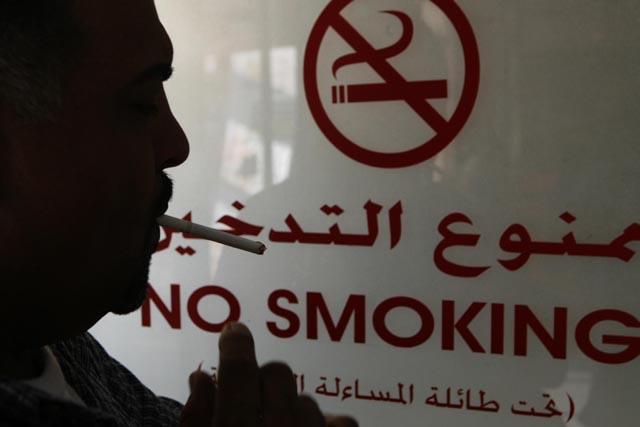AMMAN — Jordan topped Middle East countries in the prevalence of smoking among males and third in terms of female smokers, according to a global study.
Research conducted by the Institute for Health Metrics and Evaluation at the University of Washington showed that the rate of smoking among Jordanian men was 43.4 per cent in 2012, followed by Palestine (41.3 per cent) and Turkey (39 per cent).
The prevalence of smoking among females in Jordan stood at 8.5 per cent, following Lebanon, which was ranked first with 21.2 per cent, and Turkey (13.6 per cent).
The “Smoking prevalence and cigarette consumption in 187 countries, 1980-2012” study was published on Wednesday in the Journal of the American Medical Association in a special issue devoted to tobacco, and a copy of the study was made available to The Jordan Times.
The study aimed at estimating the prevalence of daily smoking by age and sex, and the number of cigarettes per smoker per day.
Since 1980, large reductions in the estimated prevalence of daily smoking were observed at the global level for both men and women, the study said.
However, because of population growth, the number of smokers increased significantly.
“As tobacco remains a threat to the health of the world’s population, intensified efforts to control its use are needed,” the study recommended.
“Tobacco is a leading global disease risk factor. Understanding national trends in prevalence and consumption is critical for prioritising action and evaluating tobacco control progress.”
According to the study, global modelled age-standardised prevalence of daily tobacco smoking in the population older than 15 years decreased from 41.2 per cent in 1980 to 31.1 per cent in 2012 for men and from 10.6 per cent to 6.2 per cent for women.
However, despite the decline in modelled prevalence, the number of daily smokers increased from 721 million in 1980 to 967 million in 2012.
Local efforts
Despite enacting a law that prohibits smoking in public places four years ago, it is not “fully implemented” a Health Ministry official told The Jordan Times in a recent interview.
“Fighting smoking is more difficult than fighting the use of drugs,” said Malek Habashneh, director of the ministry’s awareness department.
“Using and trading with drugs is prohibited, and that is why it is easier to deal with the problem. But the sale and manufacture of cigarettes is allowed, which makes smoking more difficult to curb,” Habashneh argued.
The Public Heath Law was enforced in the Kingdom’s shopping malls and Queen Alia International Airport in March 2009, and in fast-food restaurants in June of the same year.
A Cabinet decision prohibiting smoking in ministries and public institutions went into force on May 25, 2010.
According to the law, smoking is prohibited in public places, which include hospitals, healthcare centres, schools, cinemas, theatres, libraries, museums, public and non-governmental buildings, public transport vehicles, airports, closed playgrounds, lecture halls and any other location to be determined by the health minister.
“Shops are allowed to sell tobacco without a licence,” Habashneh said, noting that this is one of the obstacles “we face in our attempts to reduce the prevalence of smoking and the availability of cigarettes”.
However, the ministry is currently working on bylaws to regulate the sale of cigarettes, he added.
Moreover, another bylaw will be issued soon to regulate the manufacturing and selling of “massell” — tobacco marinated in flavoured molasses used in arghilehs.
In addition, the ministry is currently working with the Finance Ministry to revisit the tax on tobacco and come up with a new system “in a bid to lower demand on cigarettes”.
















